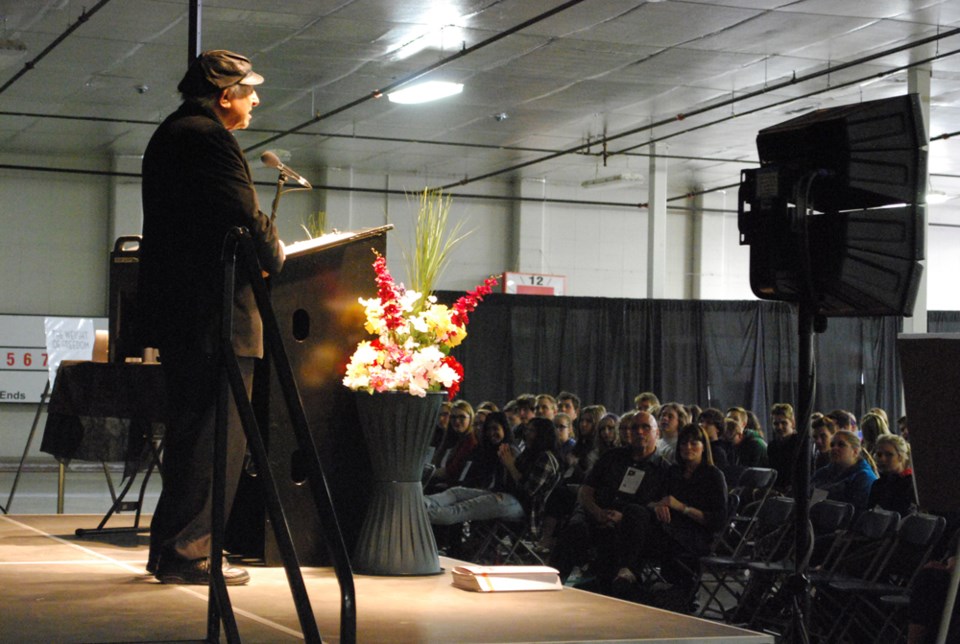It has been over 71 years since the liberation of the concentration camps.
With the Nazis in power, 11 million people perished in labour and concentration camps, 4 million of those being people of the Jewish faith.
On Apr. 19, 650 Horizon students, educators, and staff got the chance to learn about the impacts at the 2nd Annual Holocaust Symposium.
Event coordinator, Larry Mikulcik, wanted students to know that they’re voices have power.
Mikulcik brought forward the idea of the first symposium last year and the Horizon board was completely behind it.
Horizon’s example is also being used by the Saskatchewan Human Rights Commission to increase Holocaust education in other school divisions.
Special guest, Nate Leipciger, survived Auschwitz, Dachau, and other concentration and labour camps along with his father. The majority of his family, including mother, sister, aunts, uncles, and cousins were killed in concentration camps.
By the end of the war, Leipciger, his father, and three cousins were the only survivors from Leipciger’s family.
The message that Leipciger wanted to bring to the symposium is that they are the future of the world.
“Be on your guard. We have to be generous. We have to accept those who need our help but we also must be cognisant of the fact that there are dark forces in the world that wish us ill.”
Taking in refugees is an important sign that the world is getting better, says Leipciger. But we do have to separate the genuine refugees from the ones that want to hurt us, he says.
This is not impossible.
Those who have done harm are small minorities and we cannot punish the vast majority, says Leipciger.
“Those who have come to hurt us come to fight the refugees we accept. They hope by doing these acts of terror, we’ll get discouraged and we’ll stop the flow of refugees.”
Education and knowledge is the best defense against these forces, says Leipciger.
Israel is the only state the Jewish people have known and Leipciger wishes for it to be recognized as its own nation one day. It is going to be difficult but it is achievable, he says.
Recalling his memories of the Holocaust while writing the book was difficult for Leipciger but it was also a form of healing.
“The images I was writing about were not very pretty and they were difficult to recall. But when I was finished I realize there was a liberating situation because now that it was on paper I could forget what I was carrying all these years.”
Leipciger goes back to the concentration camps every year. How else are you going to teach students other than to show them what happened, says Leipciger.
“I take them to the camp and I tell them, ‘touch the wire,’ ‘touch the barracks,’ ‘touch the bricks,’ ‘touch the floor.’ This is reality, not fiction.”
Kevin Garinger says the greatest lesson students can learn from this is that students can make a difference.
“The fact that words have so much impact and so much meaning, we really have to guard that from a standpoint of what we say verbally and what we write.”
Doing research on the Holocaust for speaking as a survivor and for his book, the Weight of Freedom, Leipciger found articles written about the concentration camps proving that the world knew what was going on.
Just like during the Holocaust, when Leipciger was trying to immigrate out of Europe after liberation, no one was willing to take Jewish people into their own country, including Cuba, Canada and the United States.
A big message for the students was to not be a bystander. Acting on bullying is an important step on preventing atrocities, like the Holocaust. For the person being bullied, that is an atrocity, says Garinger.
Making sure all people are treated with respect and dignity is a challenge but people need to understand the impact of their words and actions.
“We don’t want people to feel badly about who they are, they don’t deserve that. So how do we continue to make sure that they are respected for who they are and what they’re bringing into this world?”
Standing up against bullies can be difficult, says Leipciger, but students need to take a stand. Not to be brave, not because people are watching them, but because of their principals and what they believe in, says Leipciger.
“If you believe the principle, you stand up for it. You don’t think of the consequences and you don’t think who’s with you and who’s against you. You just do it.”
One of the cornerstones is standing by and doing nothing is just as bad as being the perpetrator, says Mikulcik, especially if there is a crowd gathered.
That is often what the bully wants, says Mikulcik.
“That’s how you stop a bully is that the people around intervene by saying, ‘no, this is not right.’”
Recognizing the Holocaust and preventing it from happening again starts with these students.
“We always have to look back,” says Garinger, “it’s important to see where we’ve been.”




